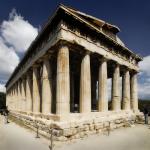|
This section contains 957 words (approx. 4 pages at 300 words per page) |

|
Emporiums. Although trade and commerce were not the principal motives for planting colonies, they were still important activities in the Archaic Period (700-480 B.C.E.). Once they came into existence the colonies no doubt gave a certain impetus to the international exchange of goods. However, more trade was carried on at the emporiums or trading posts.
Al Mina. An early trading post was Al Mina on the northern Levantine coast of Syria. It was founded around 800 B.C.E.; its Greek name has not survived. Al Mina shares a feature with most emporiums of the early Archaic Period, its great distance from the homeland. Ampurias was on the distant northeastern coast of Spain, and other trading posts were planted in similarly remote places: on the northwest coast of Sicily, on the Sea of Azov in south Russia, and in...
|
This section contains 957 words (approx. 4 pages at 300 words per page) |

|




